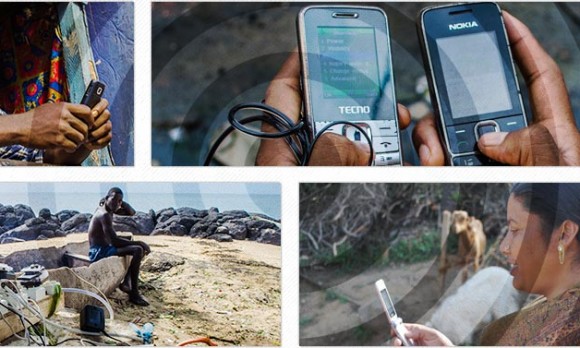Radar
By Figen Gunes
“We fool ourselves by thinking we are having a global dialogue,” says Libby Powell, co-founder of Radar, a social enterprise which aims to diversify voices in global news. “But a lot of current content is coming from urban, educated and often male sources with access to smart phones or an internet connection. People who are the most vulnerable in this world are the least likely to have tools to report their experiences,” she adds.
Through training citizen reporters in isolated communities Radar is reaching the parts other news organisations fail to tap into. One of the Radar reporters is Patrick Lahai, a double amputee who gained recognition from the BBC World Service for his work as a citizen reporter after being trained by Radar just before the Sierra Leone elections. Having lost both his arms to the rebels during the civil war, Patrick has found ways of using his stumps to make calls and send texts. He reported live from the polling station during the national elections last November and was featured by the BBC Click programme.
Other Radar reporters have had work published by leading media outlets, including the Guardian, the New Internationalist magazine and the Ecologist. Radar can be used by people who are uncomfortable writing formally or consider themselves illiterate and can only text phonetically. Their news has been shared on social media platforms and seen by over one million people.
Both of Radar’s co-directors Powell and Alice Klein have worked as freelance journalists and are passionate about the right to communicate and the power of transparent, inclusive media. Last month, they co-won the Guardian Tech Talent competition and was invited to present their project at the Activate London Summit to an audience of media and technology experts.
With their tagline ‘From Margins To The Front Page’, Radar works as an internal communication gateway via a web app that combines an SMS gateway, an editorial dashboard and a micro-site to connect offline communities to digital news channels and amplify their voices. This allows a news alert sent via SMS from a remote community to be shared online with influential audiences around the world within minutes via the app. Radar commissions mobile blogs for 15 dollars and if a reporter’s story is published by a news outlet, they get all the income generated.
They cooperate with NGOs and community groups who work with local communities who are excluded from public dialogue, particularly slum dwellers, rural women and girls and youth with disabilities. They train community members to send microreports via text message. Because it involves a simple text message.
Both the training framework and the web app they have developed are highly flexible and can be adapted to respond to complex environments and contexts such as delivering real time news from communities to charities working off-grid.
With a background in humanitarian aid in Palestine, Powell defines the Radar model as “gamechanger” and adds: “Freelance reporting is still something in the realm of the elite in Africa. We are trying to give citizens an unprecedented way of sharing vital news without waiting for someone to come from the urban centres to cover it on their behalf. As we operate as a news agency for trained reporters, there is also a chance for them to earn money from their reporting.”
After starting up less than a year ago, Radar has been highly successful, supporting the reporting of two African elections and training more than 250 citizen journalists. It has amplified voices from within groups overlooked by mainstream media and opened up an opportunity for their opinions to be heard on issues that matter to them. For example, albinism in Kenya, homophobia in Mombasa, and a corrupt employment system in Sierra Leone, amongst many other stories. Over half of the people they work with are women and girls and over a third have a disability.
This summer, Radar will be setting up a pilot project close to home, covering Bradford, Glasgow, London with the aim of giving marginalised UK communities a platform in a bid to increase social inclusion. Some of the groups they will be working with include excluded urban youth and Muslim women in Bradford, largely home-based, and excluded from dialogue in those regions. They are also particularly interested in working with undocumented young people (hostel dwellers) who are estimated to be around 120,000 in the UK.
Additional reporting by Celine Callow















Write Your Comment